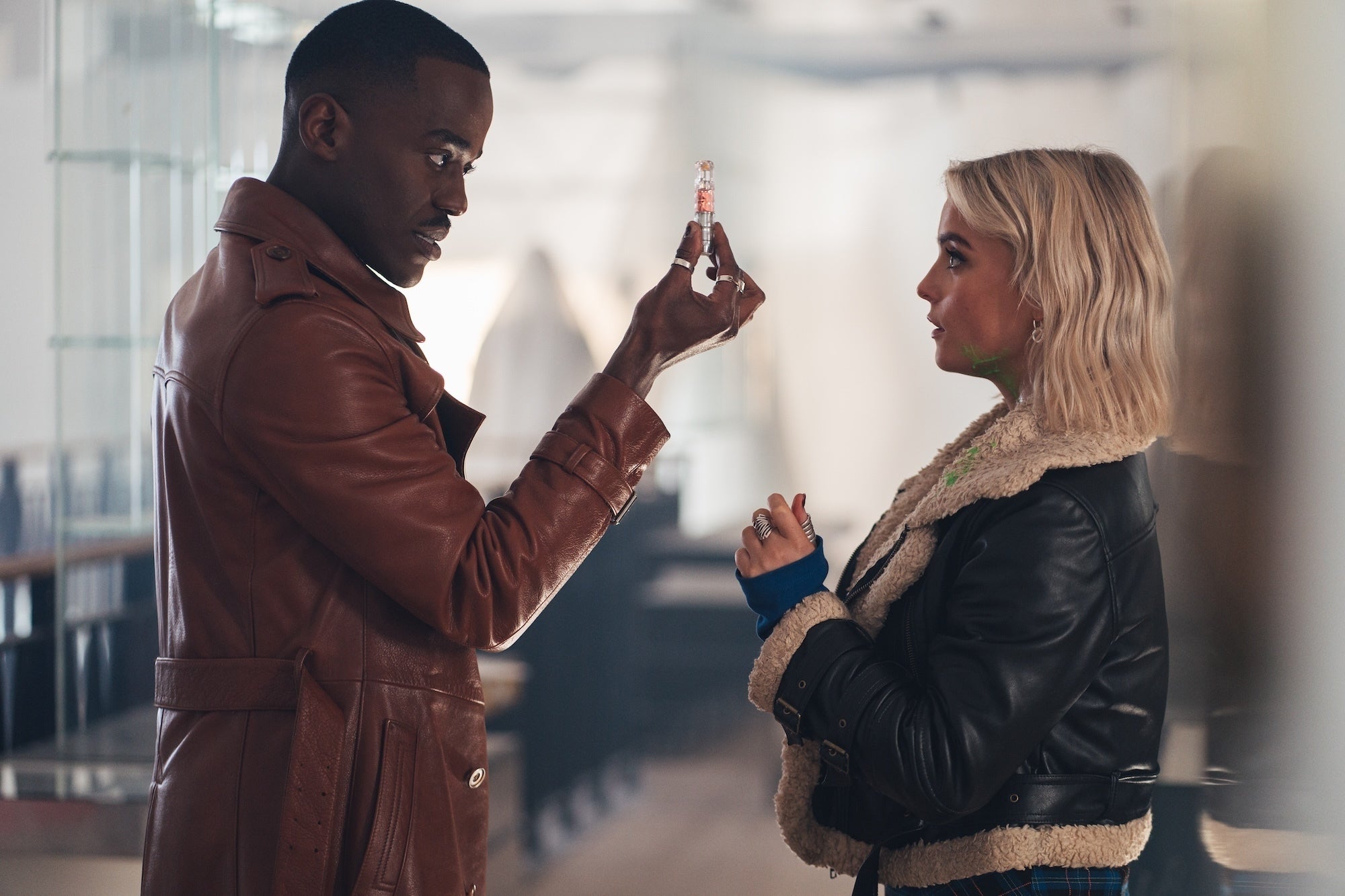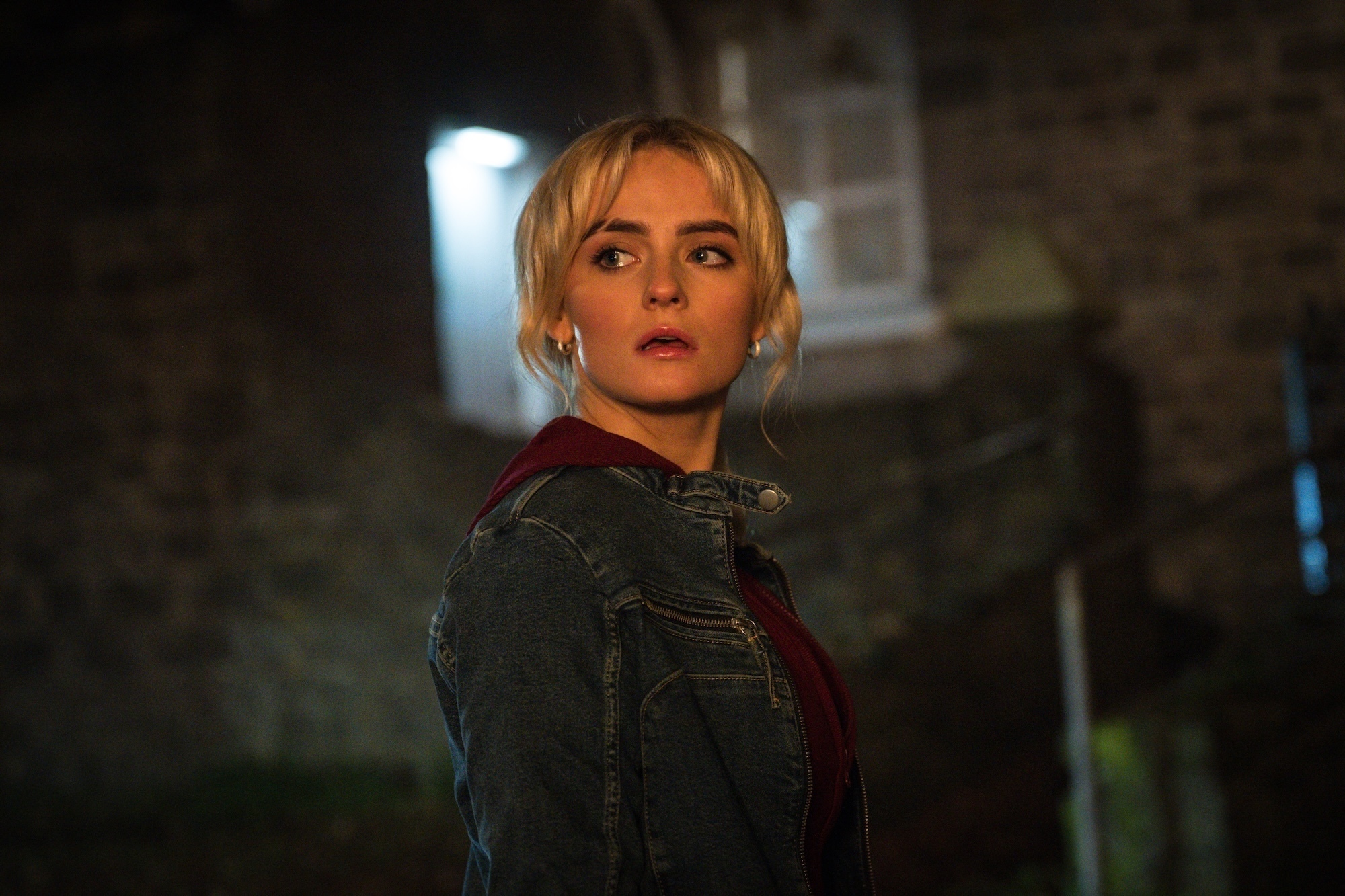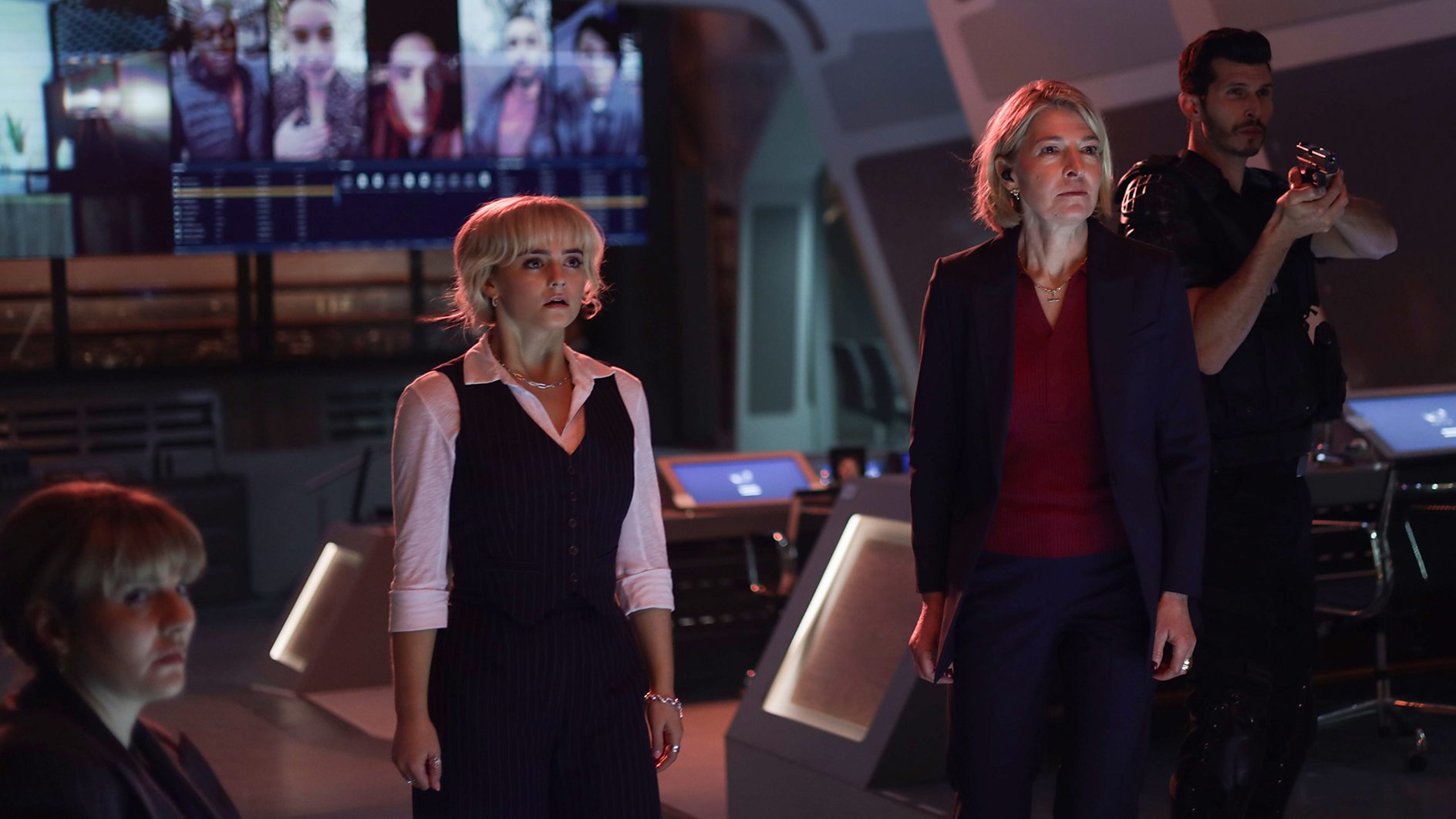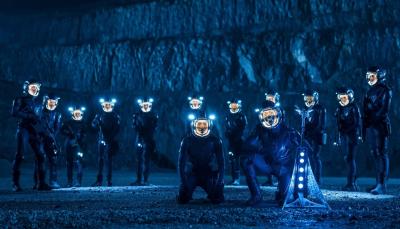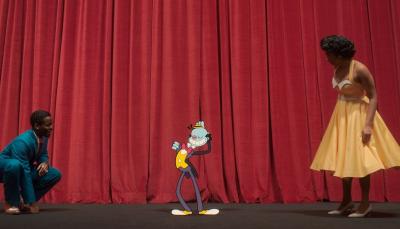In "Lucky Day," Ruby Sunday Is a 'Doctor Who' Companion On Her Own
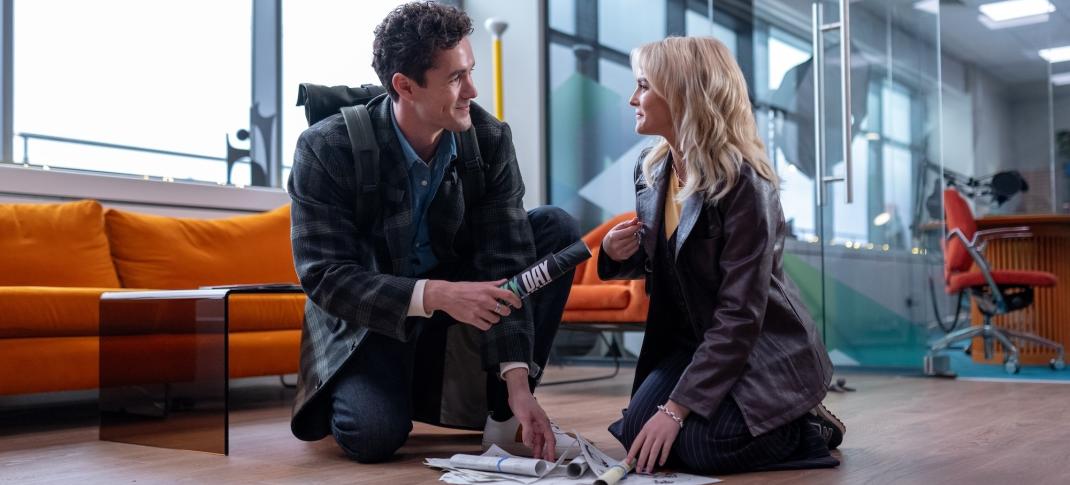
Jonah Hauer-King and Millie Gibson in "Doctor Who"
(Photo: James Pardon/BBC Studios/Disney/Bad Wolf)
Though Doctor Who ostensibly follows the adventures of a two-hearted alien who travels through space and time in a blue police box, the show's heart is most often found in the stories of the companions alongside him. Showrunner Russell T. Davies has always been interested in the idea that traveling with the Doctor is merely a means by which ordinary people discover that they are capable of extraordinary things. But the question of what happens after these adventures conclude and the companion returns home also fascinates him.
We've seen glimpses into the post-TARDIS life of previous Davies companions like Rose Tyler (Billie Piper) and Donna Noble (Catherine Tate). Episodes like "School Reunion" and "The Power of the Doctor" have touched on the disorienting nature of trying to go back to living an everyday life after experiencing something so profoundly amazing. But "Lucky Day" does something unprecedented, focusing entirely on companion Ruby Sunday's (Millie Gibson) life after leaving the TARDIS, giving her an Earth-bound adventure in which the Doctor barely appears, and expanding the scope of the series beyond the world of the Doctor and his blue box.
Ruby's life changed after traveling with him, but their time together also affected the person she became. Intriguingly, those changes are not always entirely positive ones. Ruby is stronger, more self-assured, and more capable than when we first met her in "The Church on Ruby Road," but she's also lonelier, less trusting, and more guarded. She's battling something that looks an awful lot like low-grade PTSD, and while she ultimately chooses to repay hurt and cruelty with kindness and mercy in the same way that the Doctor would, she still has a fair amount of healing to do of her own.
So-called "Doctor-lite" episodes are a staple of Davies' modern Doctor Who, and some of its best installments have been those in which the series' titular character is barely present. (Examples include "Blink," "Turn Left," and last season's "73 Yards".) Yet "Lucky Day" is unique in that it's not a story in which the Doctor's absence is presented as temporary. Ruby hasn't heard from him since she returned home. While her family life seems to have settled into something resembling a charmingly chaotic new normal, it's also evident that she's not entirely sure what she should be doing with herself at the moment.
She seems initially drawn to the handsome podcaster Conrad (Jonah Hauer-King) largely because he lets her revisit that girl who once traveled in the TARDIS and saved lives. Conrad, for his part, has his own set of emotional baggage. He met the Doctor in 2007 when he was just 8 years old (the scene with Fifteen and Belinda that opens the episode) and has been obsessed ever since. He's spent years looking for another glimpse of the TARDIS, finally succeeding in 2024 when he stumbled upon Fifteen and Ruby on what appears to have been one of their first adventures together. (Apparently, this happens almost directly after the events of "The Devil's Chord".)
They're attempting to subdue an alien known as a Shreek, vicious predators who mark their future prey by secreting a specific pheromone onto them. Conrad snaps a pic of Ruby and gets oozed on by one of the creatures, leaving him vulnerable to a future attack.
Initially, Conrad and Ruby's relationship is almost painfully charming. She guest stars on his conspiracy-minded, Doctor-focused podcast and gives him the antidote that will keep the Shreek away. He listens to her stories of previous adventures, and she delights in having someone to tell them to who actually believes what she's saying. Even her family is into it, with both Carla and Cherry Instagram-stalking the new boyfriend before the pair head out to dinner. His intense Doctor obsession should probably present as more of a red flag, but their chemistry is sweet, and it's easy to see why Ruby falls for him. Which makes his sudden heel turn all the more heartbreaking.
Given that we've already had an episode this season that revolved around incels and misogyny, perhaps Conrad's secret shouldn't be as surprising as it is. Rather than his Doctor fixation coming between them, it turns out that Conrad is a complete grifter, the head of a bizarre organization called "Think...Tank," who has been running a long con on Ruby. The show doesn't spell out if Conrad (who let's not forget has met the Doctor) believes UNIT and aliens are all part of an elaborate hoax perpetrated by the U.K. government to steal taxpayer money, or if spreading disinformation to that effect just turned out to be the message that worked.
However, the truth of his beliefs honestly doesn't matter. A country that collectively experienced world-shaking events, deciding to memory hole objective reality in the name of a more comforting group delusion, should feel like something only possible on a science fiction program. (And yet!)
In a frighteningly timely sequence of events, the online and media storm that follows turns the public against everything from UNIT and the British government to basic facts. Ruby's family is forced into hiding; UNIT commander Kate Lethbridge-Stewart (Jemma Redgrave) gets dragged in front of Parliament; and Conrad gleefully soaks up the public notoriety and influx of new subscribers. When he breaks into UNIT to force Ruby and friends to show the world their hidden technology and fake aliens at gunpoint, he's become as much of a monster as any being held in the tower's containment units.
That hubris is ultimately his downfall isn't surprising. (He never took the Shreek antidote, meaning that the creature currently being held at UNIT HQ is quite literally baying for his blood, and the only thing that can save him are the very women he's slandered as traitors.) But it means that Conrad's ending isn't the most compelling part of this hour's resolution. Instead, it's how the two women he's most directly harmed react to him.
Kate is righteously furious. Understandably so, given that Conrad has threatened her life's work, demeaned her father's legacy, and hurt the girl that it seems very evident she's coming to view her as a sort of protege. (Gibson and Redgrave have crackling chemistry together, and the dynamic between their characters is something Doctor Who would do well to explore in the future, either on the flagship series or the forthcoming The War Between the Land and the Sea spin-off.)
Kate's rage has a strangely "Time Lord Victorious" quality to it. She unleashes a literal monster specifically targeted to rip Conrad to pieces and doesn't seem to feel the slightest bit bad about it. She continues to push things well past the point of good sense, determined to get him to retract his lies publicly, even if it means letting an alien literally eat his face on Instagram live.
Ruby ultimately ends up doing the right thing, showing mercy to a man who has hurt her and belittled the most important aspects of her life. That she insists on saving him, even in the face of Kate's fury, is an example of how much she's grown as a result of her time with the Doctor, and her badass hero moment, complete with a taser and a dramatically placed closing quip, is deeply satisfying.
If there's a complaint to be had here, it's probably Fifteen who gets to read Conrad for filth in the episode's closing moments. While I fully support allowing Ncuti Gatwa to show us the Doctor's steely, utterly contemptuous side, that's a dressing down Ruby had more than earned the chance to give, or at least be present for and witness. The hour ends with Ruby deciding she needs to spend time on her own, adjusting and recalibrating herself from the world of UNIT and aliens. But this is Doctor Who —do we think she'll properly get that chance?
New episodes of Doctor Who stream on Saturdays on Disney+ in the U.S. and BBC iPlayer in the U.K.

